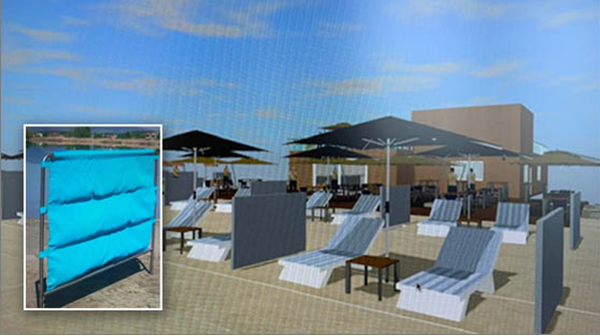
From the world of research a green solution to ensure the correct spacing on the beaches in the post-emergency phase COVID-19. The idea is to use Posidonia oceanica, a marine plant that settles in large quantities on Mediterranean shores, to create ecological safety barriers.
The innovation – developed by ENEA in collaboration with the Ecofibra company – consists of dividing panels padded with Posidonia, collected and dried, to separate the umbrellas and create access paths to the water, in line with current health regulations.
“The use during the summer season of these economic devices, easily reusable and which can also be made with 100% natural materials, would make it possible to safely use coast surfaces otherwise not suitable for swimming and to reduce the dispersion of aerosols for the benefit of accommodation tourism “, explains Sergio Cappucci of the ENEA laboratory for seismic engineering and prevention of natural risks, who invented and patented the system also useful for mats, deckchairs, cushions and other furnishings, with a view to circular economy, environmental protection and protection biodiversity, offering new opportunities for economic development.
These prototypes of ecological “booths”, about 120 cm high and 200 cm wide, are equipped with steel frames and recycled plastic or natural materials lining; at the end of the season the padding can be simply emptied on the beach where they will return to perform the original function of protection from the erosive action caused by the waves.
The devices also represent a solution to the problem of the correct management of the beached Posidonia which occupies a lot of surface, generating bad odors: if collected together with other waste, in fact, the heaps must be disposed of, with huge costs for operators and local administrations that must take care of the their removal.
Posidonia oceanica is an important indicator of the health of the sea which can also reduce coastal erosion, produce oxygen, contribute to the conservation of ecosystems and biodiversity. Their removal, in addition to removing large quantities of sand from the beaches, depriving them of natural protection from storm surges, also removes biomass and important nutrients for coastal ecosystems, with consequent impoverishment of biodiversity. A recent study has calculated that the mechanical removal of Posidonia beached, the so-called “banquette”, in 19 beaches in 9 years (2010-2018) has lost a volume of sand of over 39,000 cubic meters, equivalent to about 30,000 tons of sand.



































